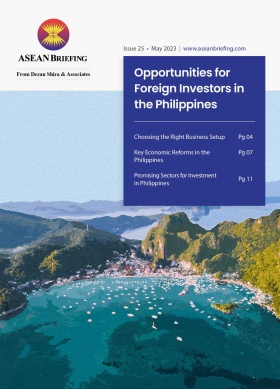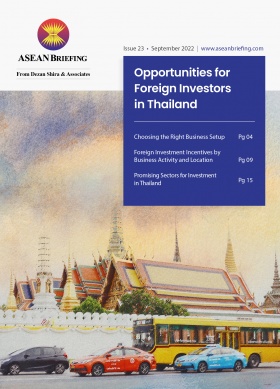UAE and Thailand Explore Trade Agreement to Foster Bilateral Investments
Thailand and the United Arab Emirates (UAE) have agreed to launch negotiations to establish a Comprehensive Economic Partnership Agreement (CEPA) and a Business Council to expand bilateral trade and investment cooperation.
The UAE and Thailand have agreed to commence negotiations to establish a Comprehensive Economic Partnership Agreement (CEPA) to create new opportunities for trade and investments between the two countries. The agreement is expected to come into force by mid-2024.
Through this trade agreement, the UAE and Thailand aim to increase bilateral trade by 10 percent within the first year of the pact’s implementation. Bilateral trade in 2022 was valued at US$20.8 billion, an increase of some 73 percent from the previous year, with the UAE enjoying a trade surplus of an estimated US$14 billion.
The UAE exported some US$17.4 billion of goods to Thailand in 2022, the majority of which was in the form of crude oil, refined oil, and natural gas. Thailand’s exports to the UAE accounted for US$3.4 billion, which consisted of car equipment and components, air conditioning units, agriculture, and telecommunication equipment. Non-oil trade between the two countries increased by 21 percent in 2022 to US$6.1 billion.
Once concluded, this would be the fifth CEPA the UAE has signed in recent years. The country has signed CEPAs with India (2022), Israel (2023), Indonesia (2022), and Turkey (2023).
Where are the opportunities for UAE investors in Thailand?
The UAE and Thailand have made significant progress in investment flow. The UAE’s foreign direct investments (FDI) flowing into Thailand reached US$300 million by the end of Q3 2022, representing 52 percent of all FDI from the Middle East region. This shows potential for enhancing economic and trade cooperation between the two countries. The CEPA will offer UAE investors greater access to the large Thai market as well as the wider Southeast Asia market of more than 600 million consumers.
Thailand is the second-largest economy in Southeast Asia, which is expected to grow 2.7-3.6 percent in 2023 following the rebound of the tourism sector and improving domestic consumption.
Value-added manufacturing
Thailand’s economy is dependent on exports, which accounted for some 60 percent of GDP before the pandemic. As such, the country’s manufacturing sector plays an important role, contributing 27 percent of GDP in 2021; the sector’s success or failure often dictates the overall health of the economy.
Over the last 50 years, Thailand has built up a robust manufacturing sector. It is now keen to attract investments for mid/high-tech manufacturing, especially as regional rivals like Vietnam and Cambodia have become new centers for low-cost production in the region.
Electrical and electronics
The exports of electrical and electronics (E&E) products amounted to over US$42 billion in 2021, leading other major export groups, such as automotive, machinery, and food. Before the pandemic, Thailand’s electronics manufacturing sector was the 13th largest hub in the world, with most large-sized manufacturers focusing on the production of integrated circuits, hard disk drives, semiconductors, diodes, and capacitors.
With increasing global demand for smart devices across the industrial and consumer landscape, Thailand can be a leading supplier, particularly for IoT devices as the 5G rollout continues worldwide. Moreover, this growing demand will spur the development of new products not just in the E&E sector but also in other digitally transforming industries, such as the automotive industry where digital components are replacing analog equipment.
High-end tourism
The economic impact of COVID-19 continues to be felt in Thailand’s tourism industry despite the country reopening its doors to international tourists and facing a tough rebuild. The industry accounted for 18-20 percent of the country’s GDP in 2019 when nearly 40 million international tourists visited the kingdom and generated approximately $US64 billion in revenue. Thailand is expected to see 25 million foreign visitors in 2023 and is aiming to generate US$71 billion in revenue.
Halal food manufacturing
Despite being a Muslim minority country, Thailand is the 12th largest global exporter of Halal products and the fifth largest producer of Halal foods. Halal food accounts for 20 percent of Thailand’s total food exports, with 60 percent of its Halal food exports going to the Muslim-dominated countries of Indonesia, Malaysia, and Brunei. As such, the country is well-placed to be a hub for Halal F&B manufacturing in the region.
Thailand has met several key strategies in the Halal food industry, such as its increasing capacity in Halal certification and formulation and upgrading its research and development.
Smart farming and precision agriculture
A country endowed with fertile soil and favorable weather cycles, Thailand possesses the right attributes to be a global agricultural powerhouse. At present, agriculture accounts for six percent of Thailand’s GDP but employs one-third of the country’s total workforce. Thailand is a leading global exporter of canned pineapples, frozen shrimp, tapioca products, canned tuna, and rubber. The agriculture, hunting, and forestry sector contributed approximately 1.38 trillion baht (US$37.9 billion) to the GDP in 2021.
Thailand is eager to transform its agriculture sector through the use of new technology, which presents opportunities in areas such as smart farming to ease industrial operations and increase production yields. Precision agriculture can help increase crop yields in different ways. For instance, precision planting involves planting seeds with a particular growth rate on soil whose properties best fit the genetics of the seed.
About Us
ASEAN Briefing is produced by Dezan Shira & Associates. The firm assists foreign investors throughout Asia and maintains offices throughout ASEAN, including in Singapore, Hanoi, Ho Chi Minh City, and Da Nang in Vietnam, in addition to Jakarta, in Indonesia. We also have partner firms in Malaysia, the Philippines, and Thailand as well as our practices in China and India. Please contact us at asean@dezshira.com or visit our website at www.dezshira.com.
- Previous Article A Guide to Employment Permits for Foreign Workers in Cambodia
- Next Article Minimum Wage for Micro Enterprises in Malaysia Comes into Force







